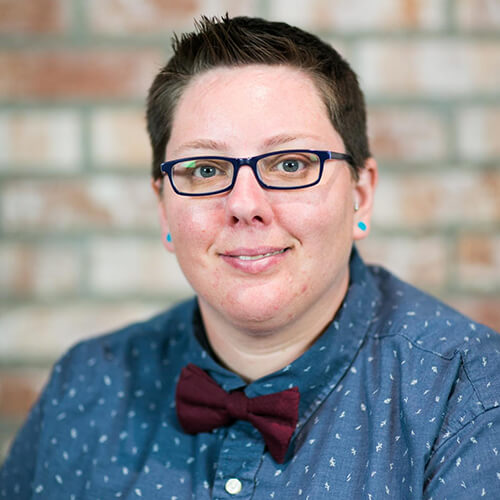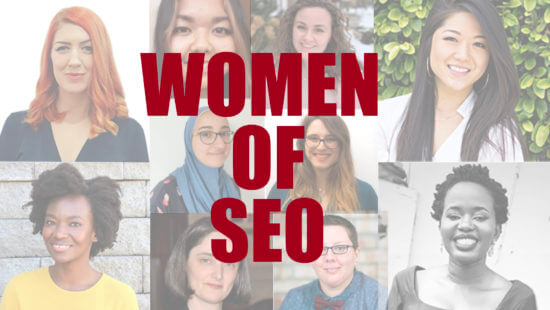10 ways you can support women in SEO
Female-identifying search marketers share their personal experiences and tips to support women in the SEO industry.
However, a recent study by Nicole DeLeon shows that in 2020, 70% of SEOs identify as male. We can do better than that.
By supporting and encouraging women, we can work to increase women’s representation in this industry. But often, the question is, “Where do I start?”
Great question. I asked a variety of female-identifying search marketers – from industry veterans to recent grads – to offer their tips on how we can all better support women in SEO. Here’s what we suggest:
1. Provide mentorship
To mentor simply means to advise or train. A common misconception is that mentorship has to be a structured relationship, or a huge time commitment. But mentorship can actually be as simple as making yourself available to offer advice.
Receiving personalized guidance can give women the confidence and information they need to achieve their career goals. Whether you can give an hour a week or 30 minutes a quarter, consider becoming a mentor to help women and BIPOC (Black, Indigenous, and People of Color) grow as marketers.
 100vw, 250px” data-lazy-src=”https://searchengineland.com/wp-content/seloads/2020/11/Jackie-Chu.png” /><figcaption><em><a href=) Jackie Chu SEO Lead, Intelligence at Uber
Jackie Chu SEO Lead, Intelligence at Uber “Try to start small with a weekly 30 minute meeting for 2-3 months. In my experience making the commitment time bound might make it easier to sign up for. In addition to it being the right thing to do, I also think mentoring is great karma points. I’m a big believer in karma and I think you get what you put out in the world, so I try to put goodness out there!”
 100vw, 250px” data-lazy-src=”https://searchengineland.com/wp-content/seloads/2020/11/Chima-Mmeje.jpg” /><figcaption><em><a href=) Chima Mmeje, SEO Copywriter and Content Strategist at Zenith SEO Copywriting Service
Chima Mmeje, SEO Copywriter and Content Strategist at Zenith SEO Copywriting Service“When I started out in SEO, I felt isolated because I didn’t know other SEOs in the international community who looked like me or faced the unique challenges of being Black, Female and African.
I had to figure out a lot of stuff on my own, which meant that growing, upskilling and scaling took more time than if I had someone to guide me.
It would be awesome if we had communities like Women In Tech SEO, but for African SEOs where we could enjoy support and upskill more quickly than if we were playing solo.
I also think there should be more mentorships to encourage black women to embrace SEO. I have a similar program where copywriters from developed countries offer copy feedback and mentorship to copywriters from developing countries. A program like this in SEO could be the game changer that bridges the gap and helps more women gain the needed visibility and shatter glass ceilings only touched by male SEOs.”

“As a recent graduate, I’ve found the field of digital to be more conquerable because of my serendipitous encounters with professional women who were so enthusiastic to share their experience and help me along in mine.
Mentors are everything. It can be direct as an actual mentorship or having a one-time conversation on LinkedIn – both have helped me greatly. For professional women to open their doors to those just starting, it means tremendous support, and it also means taking an industry as vast as this one and creating communication and community out of it, two things I believe are very important in the world of digital.”
2. Offer a flexible work environment
When workplaces offer flexibility in hours and location, they help women create a better work-life balance. This can also allow more women to return to work and remain productive after starting a family, which can keep them on track for salary increases and promotions. At the same time, companies benefit from holding onto their talent and reducing turnover.
 100vw, 256px” data-lazy-src=”https://searchengineland.com/wp-content/seloads/2020/11/Nicole-DeLeon.png” /><figcaption><em><a href=) Nicole DeLeon, Founder and Lead Strategist at North Star Inbound
Nicole DeLeon, Founder and Lead Strategist at North Star Inbound“Statistics across industries show that when push comes to shove, women breadwinners still do more housework and childcare than men. And the pandemic has only exacerbated this disparity. While employers can’t change what happens at home, they can make it easier for women to meet more of their responsibilities by allowing for a less structured work environment. Many women are willing to put in hours before their kids wake up or after they are in bed. Let them.”
3. Prioritize diversity in speaker line-ups
When we hear from the same voices, we miss out on an incredible opportunity to learn. Make diversity in your speaker line-ups and keynotes a top priority. And instead of viewing it as a box to check, invest time into connecting with potential speakers with different experiences and points of view, and not just by title or reputation.
 100vw, 250px” data-lazy-src=”https://searchengineland.com/wp-content/seloads/2020/11/Areej-AbuAli.jpg” /><figcaption><em><a href=) Areej AbuAli, Founder of Women in Tech SEO
Areej AbuAli, Founder of Women in Tech SEO“If you’re in charge of organizing a speaker line-up, then please offer opportunities for new and diverse speakers.
If you’re a speaker yourself and used to having the spotlight, consider recommending an underrepresented person rather than taking the opportunity for yourself.
If you’re keen to speak yourself then before committing to being a part of an event, always ask what the speaker line-up is and provide recommendations if it doesn’t feel diverse enough.”
4. Build up women’s confidence
Imposter syndrome is oh so real, with an estimated 70% of individuals experiencing the phenomenon at least once in their career. This feeling of inadequacy meets its match when we foster confidence in our peers’ work and abilities.
 100vw, 250px” data-lazy-src=”https://searchengineland.com/wp-content/seloads/2020/11/Izzi-Smith.png” /><figcaption><strong><em><a href=) Izzi Smith, Technical SEO Analyst at Ryte
Izzi Smith, Technical SEO Analyst at Ryte“How can you help? If you’re lucky enough to have achieved this fuzzy feeling of confidence, I would really encourage you to do all you can to offer a helping hand to those female-identifying SEOs who struggle with this.
Start by identifying your strong points and use that for good (like a wonderful, nerdy superhero). Have some experience talking at conferences? Offer support for those willing to give it a try by providing test-runs or presentation feedback. Consider yourself technically savvy? Be a sparring partner for someone who is unsure of their assumptions and audits. Enjoy making people smile? Give some praise to those around you who have shared knowledge and done something that was trying to help their fellow SEOs.
Even a quick 30 minute – 1 hour break a week to do these things can make such a positive impact. If you keep working to empower those around you, it not only helps make this community more welcoming and accessible, but it means we have even more smart minds contributing to creative ideas and strategies that help us tackle SEO challenges in better ways.”

“Being the “outsider” can be intimidating; even asking a question can make me insecure at times because I don’t want to seem like I don’t know what I’m doing. I think that in order to close the gender gap in this field, women can be supported by developing more confidence. They have just as much of a right to be there as men, but I think that self-doubt can be a roadblock at times.”
5. Work with different communication styles
There is no one-size-fits-all when it comes to communicating. Taking time to learn each team member’s communication style and preferences can offer the foundation they need to succeed.
 100vw, 250px” data-lazy-src=”https://searchengineland.com/wp-content/seloads/2020/11/Jessica-Girardi.jpg” /><figcaption><em><a href=) Jessica Girardi, Strategist at Uproer
Jessica Girardi, Strategist at Uproer“Ask your employees what their natural communication style is, and find a way to work with that. As an immigrant, there are many things I used to say or ways I used to communicate in Australia that just don’t work in the United States. My style of communication is relaxed, but to the point – I don’t mince words, but I like to talk seriously over coffee.
In the US, I’ve always felt the need to couch my words, be a little nicer, and to always have serious conversations in the conference room. Having the room to communicate in a style that works for me – at least internally – makes it easier for me to get my work done and increases the enjoyment I get out of my work. Communication is key.”
6. Advocate for gender and pay equality when hiring
Don’t accept the outdated adage, “There just aren’t as many women candidates.”
Consider if there are any barriers for women in your hiring process. For instance, say the main promotion method for your job posting is sharing with your network, but your network is composed mostly of men.
Or, consider if your job description contains exclusive or masculine language like “rockstar,” “expert” or “assertive.” Overly-masculine words suggest an overly-masculine culture, which can be uninviting to women as well as minority groups.
There are many barriers that contribute to a candidate pool mostly void of women. By becoming aware of the often unconscious biases that create these roadblocks, we can start to break down that outdated assumption for good.

“I think the first step in supporting female-identifying professionals in the search industry is to continue to bring awareness that there are inconsistencies in important areas like pay and hiring of women. Unfortunately this is common in many industries.
After awareness is brought to the issue, I think it’s really important for prominent people and organizations (both in-house and agencies) to speak out in support of equal pay and the importance of gender equality in hiring for SEO roles. Having supportive communities like Women in Tech SEO (huge props to Areej AbuAli) is also so important for giving women a safe space to talk about the struggles they are having and get advice from other women.”
7. Make diversity initiatives a regular part of your business
Hiring women and equal pay is a great step, but it certainly shouldn’t stop there. Once women are hired, invest resources in them to help them continue to grow.
In short, don’t let diversity be a one-time conversation. When it’s an ongoing consideration in all business initiatives, from holiday celebrations to leadership positions, you offer real support.
 100vw, 250px” data-lazy-src=”https://searchengineland.com/wp-content/seloads/2020/11/Daisy-ree-Quaker.png” /><figcaption><em><a href=) Daisy ree-Quaker, SEO Content Marketer
Daisy ree-Quaker, SEO Content Marketer“If you have a platform, amplify, and support diverse professionals. If you run a team or company, increase representation with who you hire, mentor, or promote. If you run an event, solicit a diverse panel of speakers. Make diversity initiatives a part of regular business, not just de rigueur.”
8. Speak to the new generation of marketers
It’s so important to introduce female-identifying professionals to this field. If universities don’t cover it in their curriculum, that leaves a gap of women who may not know enough about SEO to consider it as a career.
Pursue thought leadership opportunities like speaking for universities or a local organization that supports students and/or recent graduates. By speaking about the topic and chatting one-on-one with the new generation of marketers, we create a space for them to get interested in the field and seek to learn more.
9. Publicly support women on social media
The more we see and can relate to those who have success, the more confidence we have to pursue those same roles. By increasing the reach of women across social media, we show the rest of the world our place at the SEO table, so to speak. Some easy ways to do this?
- Like and share posts
- Comment thoughtful remarks
- Follow and connect with women and BIPOC across platforms
- Let women know you like their content offline as well – it’s encouraging when someone brings the compliments off social and says, “Hey, I like your content.”
While we’re on the topic: Please be KIND on social. If you disagree with someone else’s opinion and feel you must speak up, aim to have a respectful and open-minded discussion that leads with questions rather than opinions.
And consider having these conversations privately; it can be intimidating for new creators to see criticism commented across many posts.
10. Listen
This final tip goes beyond SEO. If you haven’t come up against this firsthand, imagine you experienced an injustice at work, and you were ignored. That could tarnish your view of your workplace – and the industry as a whole – forever.
If an issue is raised by a woman or person of color, please don’t shrug it off. Listen, and together we can create an industry that honors and respects every person.



